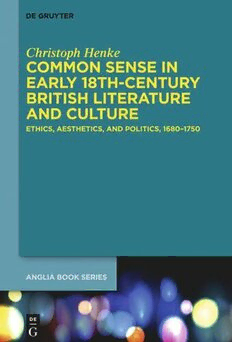
Common Sense in Early 18th-Century British Literature and Culture: Ethics, Aesthetics, and Politics, 1680–1750 PDF
02014·1.223 MB·English
Most books are stored in the elastic cloud where traffic is expensive. For this reason, we have a limit on daily download.
Preview Common Sense in Early 18th-Century British Literature and Culture: Ethics, Aesthetics, and Politics, 1680–1750
Description:
While the popular talk of English common sense in the eighteenth century might seem a by-product of familiar Enlightenment discourses of rationalism and empiricism, this book argues that terms such as ‘common sense’ or ‘good sense’ are not simply synonyms of applied reason. On the contrary, the discourse of common sense is shaped by a defensive impulse against the totalizing intellectual regimes of the Enlightenment and the cultural climate of change they promote, in order to contain the unbounded discursive proliferation of modern learning. Hence, common sense discourse has a vital regulatory function in cultural negotiations of political and intellectual change in eighteenth-century Britain against the backdrop of patriotic national self-concepts. This study discusses early eighteenth-century common sense in four broad complexes, as to its discursive functions that are ethical (which at that time implies aesthetic as well), transgressive (as a corrective), political (in patriotic constructs of the nation), and repressive (of otherness). The selection of texts in this study strikes a balance between dominant literary culture – Swift, Pope, Defoe, Fielding, Johnson – and the periphery, such as pamphlets and magazine essays, satiric poems and patriotic songs.
See more
The list of books you might like
Most books are stored in the elastic cloud where traffic is expensive. For this reason, we have a limit on daily download.
